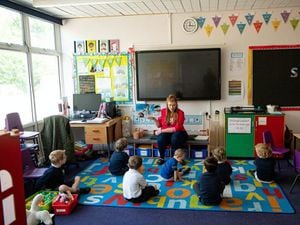Schools expect nearly half of families to keep children at home – survey
Primary schools in England have been told to reopen to pupils in Reception, Year 1 and Year 6 from this week.

Schools across England anticipate a significant number of pupils and teaching staff will not return to the classroom this week despite the easing of coronavirus lockdown measures, a report suggests.
More than a quarter (29%) of available teachers will only be able to work from home, according to the National Foundation for Educational Research (NFER) study, prompting fears that shortages will affect schools’ ability to provide the same level of teaching quality.
Primary schools in England have been told to reopen to pupils in Reception, Year 1 and Year 6 from this week, with nurseries also expected to resume sessions.
It comes after Prime Minister Boris Johnson announced on Thursday that the Government’s five key tests required for the easing of the lockdown had been met, meaning schools can admit more pupils this week.
But the NFER report, based on a survey of more than 1,200 senior leaders in schools in England, suggests that heads are expecting nearly half (46%) of families to keep their children at home.
The study finds that school leaders with the highest proportion of pupils eligible for free school meals estimate that more of their families (50%) will keep pupils at home, compared with an average estimate of 42% from school leaders with the lowest proportion of free-meal pupils.
It raises concerns that pupils in most need of education “will be least likely to receive it”, the report says.
A separate poll of parents, carried out by the Early Years Alliance (EYA), has also found that only 45% of parents whose childcare providers are opening from Monday are planning to take up their place.
Schools, colleges and nurseries across the UK closed 10 weeks ago due to the Covid-19 outbreak, with classes offered only for vulnerable youngsters and the children of key workers.
The report suggests that the impact of the pandemic on disadvantaged pupils dates back to the period before lockdown, as leaders reported a “significant drop” in their attendance before schools closed.
School leaders in the West Midlands (82%), London (82%) and the North West (79%) were also most likely to report some impact from Covid-19 on schools – such as staff availability and pupil attendance – prior to full closures in March.
Ministers have come under pressure from education unions and council leaders, who have urged the Government to reconsider its plans to open schools more widely from June 1 amid safety concerns.
Findings from a recent PA news agency survey of local authorities show that more than 20 councils across England – predominantly in the north of England – are advising schools not to open to more pupils this week, with some citing fears that the NHS Test and Trace system will not be “robust enough” to help.
Carole Willis, chief executive of NFER, said their report suggests there is “large variation” between different types of schools across the country, with each experiencing their own challenges in opening to more pupils.
She said: “Government guidance needs to be tailored and responsive, allowing flexibility for school leaders to use their professional judgment.
“This will be necessary to manage the differing and changeable levels of staffing, parental choices and practical accommodation issues that each school is likely to experience.”
The survey also found that most school leaders feel least prepared for managing pupil movement (66%) and organising school space to enable social distancing (65%) when more pupils return.
Josh Hillman, director of education at Nuffield Foundation, which funded the NFER report, added that heads are also concerned about the challenge of running parallel school and home-based learning schemes.
He said: “This challenge is compounded by their expectations that high proportions of families will choose to keep their children at home, particularly those from disadvantaged backgrounds.
“Schools and teachers are going to struggle to prevent the disadvantage gap continuing to widen at the same time as managing social distancing, providing additional safety and hygiene measures, and dealing with inevitable staff absences.”
Education Secretary Gavin Williamson said: “Throughout the Covid-19 pandemic our decisions have been based on the best scientific and medical advice, with the welfare of children and staff at the heart of all considerations.”
On schools reopening, he added: “This marks the first step in getting all children and young people back into classrooms so they can be with their friends and teachers again, and I’m enormously grateful for all the planning and preparation the sector has done in the lead up to welcoming these first pupils back.”





